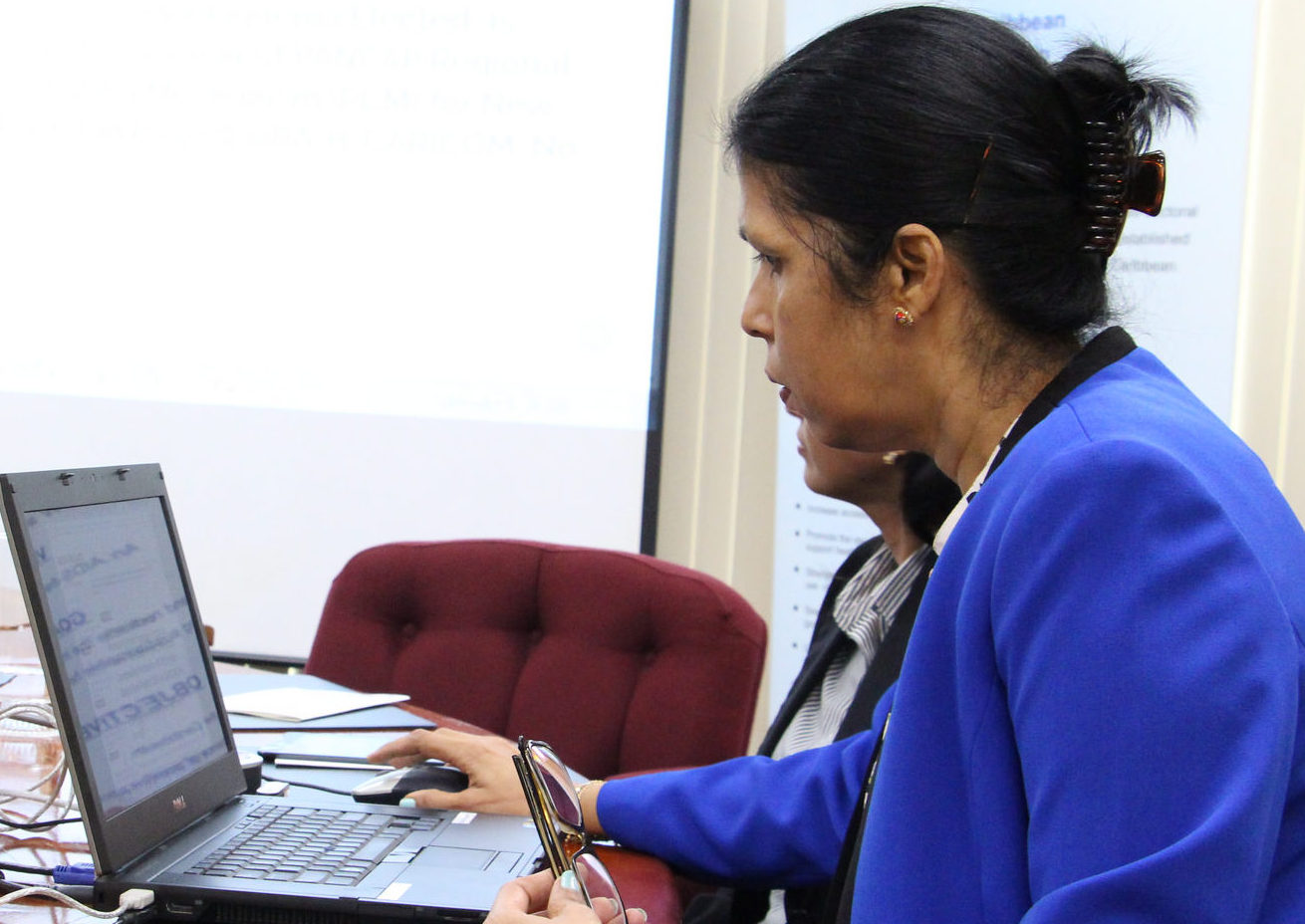
Feature Address Ambassador Manorma Soeknandan, Deputy Secretary-General – Caribbean Community (CARICOM)CARICOM, Secretariat
Honourable Minister of Education, Ms Nicolette Henry, Director, Health and HIV/AIDS Office, USAID/Eastern and Southern Caribbean, Ms Julia Henn, Director of PANCAP, Mr Dereck Springer, officials of CARICOM, development, government and civil society partners, members of the media, ladies and gentlemen.
I share the vision of the Director of PANCAP that the new redesigned PANCAP website should serve as a ‘one-stop-shop’ for information and data on HIV and AIDS in the Caribbean. Anyone seeking current epidemiological data and information on the response to HIV and AIDS in our Region should find the new PANCAP website a very useful resource tool.
I am pleased to say, that the PANCAP – K4Health Team has delivered beyond expectations on a website that strategically caters to the variety of audiences seeking information on HIV and AIDS in our Region. As you know, the PANCAP Coordinating Unit, the engine of PANCAP, has developed into a dynamic unit within the CARICOM Secretariat.
Having reviewed the new website, I am pleased to say that it has the most up to date functionality. It is available in four (4) languages, enabling PANCAP to further serve the English, French, Dutch and Spanish speaking the Caribbean.
This is the kind of dynamic platform that enables PANCAP to disseminate strategic information to meet the expressed needs of our partners. The CARICOM Secretariat has been a strong advocate for increasing literacy of the people of the region to access Information Communication Technology with the ultimate outcome of innovative, ICT-enabled economies and societies across the Caribbean region. The CARICOM Secretariat’s efforts are geared toward connecting the Secretariat to the people whom it serves.
My vision for the new PANCAP online platform is the same. The PANCAP website will serve as the all-important repository for People Living with HIV and AIDS, clinicians, technical experts in HIV and AIDS, Civil Society Organizations, key populations, youth, parliamentarians, faith leaders, private sector and all stakeholders to fill the information gap and update partners on new developments in the HIV and AIDS arena.
Networking, capacity building and knowledge sharing are key strategies for ending AIDS by 2030. The newly designed website can now help PANCAP to successfully implement these strategies among our members, partners and stakeholders.
I encourage everyone to make full use of this new digital tool and to utilise the information and resources to inform programming for eliminating HIV transmission and sustaining people living with the disease.
I wish to thank PEPFAR and USAID for funding the PANCAP Knowledge for Health Project including this website and for their ongoing support to the Caribbean. I also wish to thank Johns Hopkins University for providing the technical support for the implementation of the project.
Special thanks to Dr Shanti Singh-Anthony, Knowledge Management Coordinator, Mr Timothy Austin, Communications Specialist and Ms Mwikali Kioko, Field Director, Knowledge for Health Programme.
I end by congratulating the Director of PANCAP and the staff of the PANCAP Coordinating Unit for taking definitive action to make the PANCAP website the ‘go to website’ for information on the Caribbean’s response to HIV and AIDS.
I now officially launch the new PANCAP website.
WHAT IS PANCAP?
PANCAP is a Caribbean regional partnership of governments, regional civil society organisations, regional institutions and organisations, bilateral and multilateral agencies and contributing donor partners established on 14 February 2001. PANCAP provides a structured and unified approach to the Caribbean’s response to the HIV epidemic, and coordinates the response through the Caribbean Regional Strategic Framework on HIV and AIDS to maximise efficient use of resources and increase impact, mobilise resources and build the capacity of partners.
What are the Global AIDS Strategy 2021–2026 targets and commitments?
If targets and commitments in the strategy are achieved:
- The number of people who newly acquire HIV will decrease from 1.7 million in 2019 to less than 370 000 by 2025
- The number of people dying from AIDS-related illnesses will decrease from 690 000 in 2019 to less than 250 000 in 2025.
- The goal of eliminating new HIV infections among children will see the number of new HIV infections drop from 150,000 in 2019 to less than 22,000 in 2025.
What are the 95-95-95 Targets for ending AIDS?
- 95% of People Living with HIV know their HIV status;
- 95% of people who know their status on treatment; and
- 95% of people on treatment with suppressed viral loads.
HELPFUL LINKS:
Global AIDS Strategy 2021–2026, End Inequalities, End AIDS
https://pancap.org/pancap-documents/global-aids-strategy-2021-2026-end-inequalities-end-aids/
Caribbean Regional Strategic Framework on HIV and AIDS (CRSF) 2019-2025
https://pancap.org/pancap-documents/caribbean-regional-strategic-framework-2019-2025/
